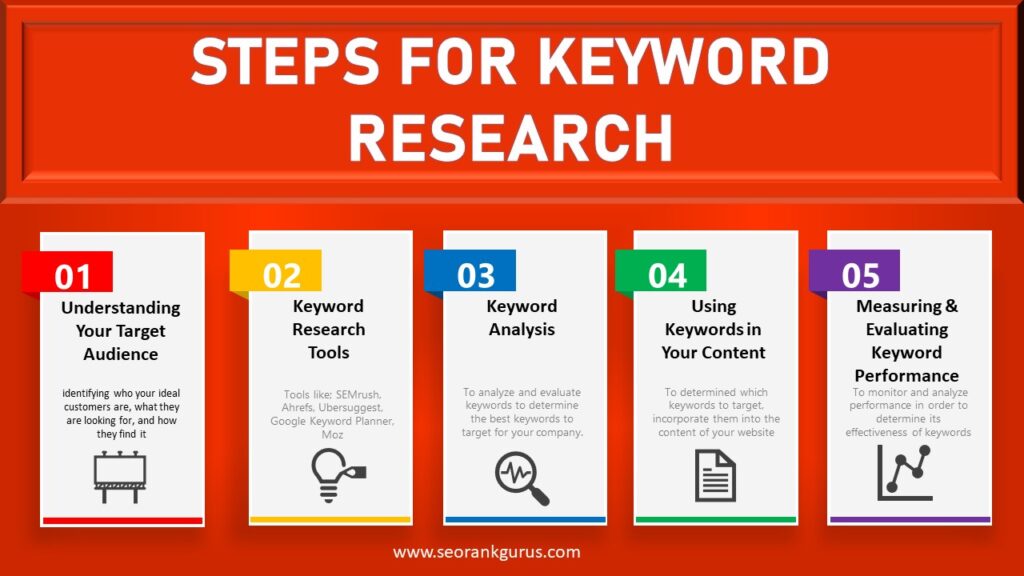Effective keyword research is essential if you want your website to rank high in search engine results. Understanding the language your target audience uses to find your products, services, and content is essential for optimizing your website for search engines. In this article, we’ll look at how to conduct effective keyword research to improve the SEO performance of your website.
What is Keyword Research?
An effective keyword research is an important step in search engine optimization that includes identifying and analyzing high-volume queries that people type into search engines to find content, products, or services. The primary goal of this process is to understand what people are looking for and customize website content to meet their needs. You can significantly increase website traffic, which is a measurable metric, by selecting and implementing the right keywords. In fact, we can say that keyword research is the fundamental of search engine optimization.
It is critical to target the keywords that people frequently use in their searches when optimizing a website for search engines. You can improve your search engine ranking, attract more visitors to your website, and ultimately increase your online revenue by selecting the right keywords and incorporating them into your website’s content.
Why is Keyword Research important?
Keyword research is essential because it allows you to understand what your target audience is searching for and what keywords they are using to find the relevant content. You can tailor your website content to meet the needs of your audience and optimize your website for search engines by conducting extensive keyword research. As a result, there may be more website traffic, higher search engine rankings, and more conversions. Businesses may struggle to attract the right audience to their website without proper keyword research, resulting in low traffic and poor performance in search engine rankings. Overall, keyword research is an important step in creating an effective search engine optimization (SEO) strategy that can assist your business in meeting your online marketing objectives. That’s why keyword research is crucial to the success of any search engine optimization campaign.
How to do Keyword Research in 2023?
To start with keyword research, begin with identifying seed keywords, or the most basic keywords that describe your company, product, or service. Then, examine your competitors’ websites to determine which keywords they are targeting. Using keyword research tools, analyze keyword trends and search volume, and assess the difficulty and relevance of the keywords you’re considering. Finally, broaden your keyword list by thinking about related terms and using keyword research tools to generate new ideas.
You can follow the following steps for effective keyword research for your website. We have made these steps concise and easy to follow.

1. Understanding Your Target Audience
The foundation of any successful keyword research strategy is identifying your target audience. It means identifying who your ideal customers are, what they are looking for, and how they find it. This data is essential for compiling a list of relevant keywords that will help you reach your target audience more effectively. You can use a variety of tools to better understand your target audience, including Google Analytics, Google Trends, and social media analytics. Google Analytics can provide insights into the demographics, interests, and behaviors of your website visitors, whereas Google Trends can help you understand search trends and changes in search behavior over time. Social media analytics can provide information about how your target audience interacts with your brand on social media platforms. By analyzing these metrics, you can gain a better understanding of your target audience’s search intent, keyword types, and search behavior, which can help you develop a comprehensive keyword research strategy tailored to their needs and preferences.
You will identify your seed keywords during this step by learning about the important and relevant topics related to your product or service. For example, if you run an online shoe store, your seed keywords will be related to shoes. For example:
- boot
- sneakers
- shoe stores
- mens shoes
- loafers
- sports shoes
- running shoes
2. Keyword Research Tools
The next step after determining your target market is to start looking at potential keywords. You want to use this approach to compile a list of relevant and well-liked keywords that your target market is likely to use while looking for goods or services related to your company. Fortunately, there are a number of useful tools at your disposal to assist you in carrying out this research successfully.
These tools include a range of features, advantages, and restrictions that can assist you in identifying and assessing the most pertinent and well-liked keywords for your company.
3. Keyword Analysis
After you’ve created a list of potential keywords, the next step is to analyze and evaluate them in order to determine the best keywords to target for your company. Search volume, competition, relevancy, and intent are all factors to consider when conducting keyword research. The number of searches that a keyword receives in a given time period, which can give you an idea of its popularity, is referred to as search volume. The number of other websites targeting the same keyword is referred to as competition. Relevancy refers to how closely a keyword matches the products or services offered by your company. The term “nuclear power” refers to the use of nuclear power in the production of nuclear weapons.
The basic purpose of keyword analysis is to select relevant keywords with high search volume and low competition for your business. This way, you may boost the exposure of your website and attract more quality traffic. Long-tail keywords, which are more precise and lengthier phrases, can also be a fantastic alternative for targeting niche audiences and bringing more targeted traffic to your site. You may choose the most effective keywords to help you achieve your business goals by analyzing and evaluating your possible keywords with the correct tools.
4. Using Keywords in Your Content
Once you’ve determined which keywords to target, incorporate them into the content of your website, including titles, descriptions, and headers. However, avoid “keyword stuffing,” which is the practise of overusing keywords in an attempt to manipulate search engine rankings. Keyword stuffing can harm your website’s rankings and make your content sound forced and spammy.
It is critical that your content reads naturally and provides value to your audience. This means you should concentrate on producing high-quality, informative content that incorporates your keywords in a natural and relevant manner.
5. Measuring and Evaluating Keyword Performance
Once your keyword strategy has been implemented, it is critical to monitor and analyze its performance in order to determine its effectiveness. Tracking your keyword rankings and the organic traffic generated by your chosen keywords is one of the most important ways to measure this. Google Analytics, Ahrefs, Moz, SEMrush, and other tools are available to help you track keyword rankings and organic traffic. These tools can help you identify areas for improvement and provide valuable insights into how well your keywords are performing.
Another important metric to monitor is organic traffic generated by keywords. This is traffic to your website that comes from search engine results rather than paid advertising or social media. Tracking your organic traffic allows you to determine which keywords are bringing the most traffic to your site and which may require more attention.
Overall, tracking and analyzing keyword performance is critical for maintaining an effective keyword strategy. You will be able to make more informed decisions about where to direct your efforts and ensure that your website is optimized for maximum visibility and engagement as a result.
Conclusion
To summarize, keyword research is an important aspect of search engine optimization that can significantly improve a website’s performance in search engine rankings. Understanding the target audience, using keyword research tools, analyzing the keywords, and effectively incorporating them into content will be critical in 2023. You can tailor your website’s content to meet the needs of your audience by conducting extensive keyword research, resulting in increased website traffic, higher search engine rankings, and more conversions. Keyword research is thus an essential step in developing an effective SEO strategy and is critical to the success of any search engine optimization campaign.

